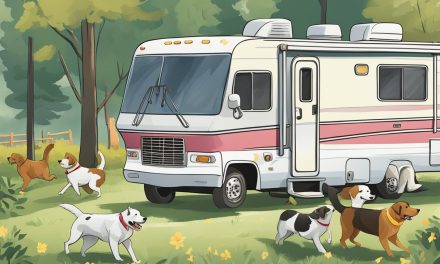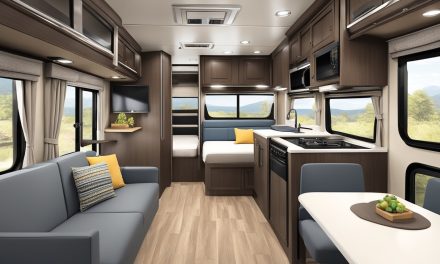You’ve been dreaming of that perfect RV adventure for months. You’ve saved every penny, cut back on dining out, and finally have enough cash to buy your dream rig outright. You walk into the dealership with confidence, expecting to be treated like royalty – after all, cash is king, right? Wrong!
These days, many RV dealers will look at your stack of Benjamins like you’re trying to pay with Monopoly money. You might think dealers would be thrilled to close a deal on the spot without worrying about financing approvals or bank delays. But the reality is far more complicated than you’d expect. The RV industry has changed dramatically, and your hard-earned cash might actually be working against you in ways that would shock most buyers.
Would you like to save this article?
1. The Government Paperwork Nightmare: IRS Form 8300
When you show up with more than $10,000 in physical cash, you’re not just buying an RV – you’re triggering a federal reporting requirement that dealers absolutely hate dealing with. The IRS requires businesses to file Form 8300 for any cash transaction exceeding this threshold, and it’s not just a simple checkbox.
This form demands your name, identification, the exact amount spent, and creates a direct paper trail to the IRS. According to the IRS guidelines, this requirement exists to combat money laundering and tax evasion. The form must be filed within 15 days of the transaction, and failure to comply can result in hefty penalties for the dealer.
Here’s the kicker: Even if the deal falls through after the cash is received, the dealer still must file the form. The government doesn’t care if you changed your mind – once that cash changes hands, the reporting wheels are in motion.
You’re basically asking the dealer to paint a target on their back for potential audits and investigations. It’s like walking into a restaurant and asking them to call the health inspector while you eat.
2. Money Laundering Laws Turn Honest Buyers Into Suspects
Modern anti-money laundering regulations have made large cash transactions feel like fishing with grenades – you’re not just catching the bad guys, you’re blowing up everything in the pond. Dealers know that accepting substantial cash amounts, even from completely honest customers, can make them look suspicious to federal authorities.
The Bank Secrecy Act and related regulations mean that any business accepting large cash payments becomes subject to increased scrutiny. Financial crimes investigators often start their trails with businesses that regularly handle significant cash transactions. For dealers, this creates a compliance nightmare that extends far beyond just filing a single form.
Industry data shows that cash transactions above $10,000 trigger automatic flags in federal databases, potentially subjecting both the buyer and dealer to further investigation. No dealer wants to become a regular fixture on the government’s radar simply because they’re accommodating cash buyers.
Think of it this way: You’re asking the dealer to join you in a spotlight that nobody wants to be under, even if both of you are squeaky clean.
3. The Logistical Security Nightmare
Cash has weight, volume, and massive security risks that most people never consider. When someone walks in with $30,000 in $100 bills, that’s a significant physical burden for the dealership to manage safely.
First, someone has to count every single bill – and that’s not a five-minute job. They need to verify authenticity, organize the money, and document everything meticulously. Then comes storage: where do you keep that much cash safely until you can get to the bank?
Consider the security implications: employees now know there’s a substantial amount of cash on the premises, increasing internal theft risks. There’s also the very real danger of being followed to the bank during deposit time. Some dealerships have been targeted by criminals who specifically watch for large cash transactions.
| Security Challenge | Dealer Risk Level | Cost Impact |
|---|---|---|
| Cash counting/verification | High | 2-4 hours staff time |
| Secure storage | Critical | Safe/security costs |
| Bank transport | High | Security escort fees |
| Insurance coverage | Medium | Higher premiums |
It’s like asking someone to babysit a ticking time bomb that happens to be made of money. Sure, it’s valuable, but the stress isn’t worth it.
4. Dealers Lose Their Financing Kickbacks
Here’s the dirty little secret of the RV industry: dealers make substantial money when you finance through them, even when they offer you a “great” interest rate. According to industry reports, dealers typically earn 20-30% commission on the gross profit from financing arrangements.
When you finance your RV, the dealer receives backend bonuses from lending institutions. These payments can range from $500 to several thousand dollars depending on the loan amount and terms. That “low” interest rate they’re offering? They’re often marking it up and pocketing the difference.
Recent RVIA survey data shows that while 45% of RV owners pay cash, dealers still prefer the 55% who finance because of these additional profit streams. The average amount financed for new RV purchases is $53,908, generating significant backend revenue for dealers.
You’re basically telling the dealer to give up their dessert when they were counting on a full meal. Don’t expect them to throw you a parade for it.
5. Cash Buyers Get Zero Leverage in Negotiations
Contrary to popular belief, cash doesn’t give you negotiating power in today’s RV market – it actually weakens your position. When dealers can’t make money on financing, they become much less flexible on the actual RV price.
Industry statistics show that RV gross profits averaged $3,760 per unit in 2023, down from $7,210 in 2022. With shrinking margins on the actual RV sale, dealers rely heavily on financing profits to maintain profitability. Remove that revenue stream, and suddenly your “quick cash sale” isn’t as attractive.
Additionally, cash buyers often think they can demand immediate delivery and skip normal dealer processes. However, dealers still need to complete all the same paperwork, perform pre-delivery inspections, and handle title transfers – none of which happens faster just because you paid in cash.
The truth is: Dealers would rather work with a financed buyer who might also purchase extended warranties, maintenance packages, and accessories than a cash buyer who wants to grab keys and leave.
You think you’re bringing them a gift, but you’re actually showing up to their profit party empty-handed and expecting the royal treatment.
What Cash Buyers Should Do Instead
Don’t despair if you’ve saved up cash for your RV purchase! The solution is simple: use certified checks, bank wires, or cashier’s checks instead of physical currency. These payment methods give you all the benefits of “cash” purchasing without triggering the paperwork nightmare.
Most dealers are perfectly happy to accept verified funds that don’t come in briefcase form. You’ll still avoid financing costs and interest payments while making the transaction much smoother for everyone involved.
SOURCES
- IRS Form 8300 Reporting Requirements
- RV Wingman YouTube Channel – Cash Payment Video
- RVIA RV Owner Demographic Profile 2025
- IDS 2024 RV Industry Trends Report
- Recreational Vehicle Financing Market Analysis – Mordor Intelligence
- IRS Motor Vehicle Dealership Q&As







